User:Sasukemario/sandbox
US Women's Amateur
1,000
test W
Below is a list of starting pitchers for the American League and National League in each Major League Baseball All-Star Game. The pitching staffs for the two leagues are determined by a ballot of current players and the commissioner of baseball, and the starting pitcher is designated by each team's manager.[1]
Lefty Gomez and Robin Roberts lead the American League and National League, respectively, having started the All-Star Game five times each. The New York Yankees have had the most starting pitchers of any team with 21, while the Los Angeles Dodgers lead the National League with 17.
Game results
[edit]| † | Elected to the Baseball Hall of Fame |
|---|---|
| W | Winning pitcher |
| L | Losing pitcher |
Notes
[edit]- ^ a b First iteration of the Washington Nationals who relocated to Minneapolis in 1961.
- ^ Second iteration of the Washington Senators who relocated to Dallas-Fort Worth in 1972.
References
[edit]- ^ "All-Star FAQ: What to know about how players are selected". MLB.com. July 7, 2024. Retrieved July 16, 2024.
- ^ https://www.baseball-reference.com/allstar/ALS-lineups.shtml
- ^ https://www.baseball-reference.com/allstar/NLS-lineups.shtml
Matches
[edit]| No. | Matches* | Stipulations | ||
|---|---|---|---|---|
| 1 | Chad Gable vs. Claudio Castagnoli vs. Jay White vs. Jon Moxley vs. Kevin Owens vs. Kofi Kingston vs. Samoa Joe vs. Sheamus | Teambuilder Ladder Match for a future BPA Tag Team Championship or BPA Apex of Triangle match | ||
| ||||
The most cursed alternate history
[edit]| No.[a] | Portrait | Name (Birth–Death) |
Term[1] | Party[b][2] | Election | Vice President[3] | |
|---|---|---|---|---|---|---|---|
| 1 | 
|
John Hancock (1737–1793) |
April 30, 1789 – March 4, 1793 |
Federalist | 1788–1789 | Benjamin Franklin | |
| 2 | 
|
George Clinton (1739–1812) |
March 4, 1793 – March 4, 1797 |
Anti-Federalist | 1792 | Pierre Van Cortlandt | |
| 3 | 
|
Thomas Pinckney (1739–1812) |
March 4, 1797 – March 4, 1807 |
Federalist | 1796 1800 1804 |
John Jay | |
| 4 | 
|
Robert R. Livingston (1746–1814) |
March 4, 1807 – May 4, 1809 |
Democratic-Republican | 1806 (special) |
Thomas Jefferson | |
| 5 | 
|
Alexander Hamilton (1755 or 1757–1836) |
May 4, 1809 – March 4, 1813 |
Federalist | 1808 | Charles Cotesworth Pinckney Pinckney resigned June 25, 1812 Rufus King | |
| 6 | 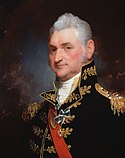
|
Henry Dearborn (1751–1829) |
March 4, 1813 – March 4, 1823 |
Democratic-Republican | 1812 1816 1820 |
John Langdon Langdon died September 18, 1819 Henry Clay | |
| 7 | 
|
Henry Clay (1777–1852) |
March 4, 1823 – March 4, 1833 |
Democratic-Republican National Republican |
– 1824 1828 |
Andrew Jackson Jackson resigned November 25, 1830 John Quincy Adams | |
| 8 | 
|
William Wirt (1772–1834) |
March 4, 1833 – February 18, 1834 Died in office |
Whig | 1832 | Amos Ellmaker | |
| 9 | 
|
Amos Ellmaker (1787–1851) |
February 18, 1834 – March 4, 1937 |
Whig | – | Vacant throughout presidency | |
| 10 | 
|
John C. Calhoun (1782–1850) |
March 4, 1837 – March 4, 1841 |
Democratic | 1836 | Richard Mentor Johnson | |
| 11 | 
|
John Sergeant (1779–1852) |
March 4, 1841 – March 4, 1849 |
Whig | 1840 1844 |
Edward Everett | |
| 12 | 
|
Winfield Scott (1786–1866) |
March 4, 1849 – March 4, 1857 |
Whig | 1848 1852 |
Charles Francis Adams | |
| 13 | 
|
Charles Francis Adams (1807–1858) |
March 4, 1857 – April 15, 1858 Died in office |
Whig | 1856 | Charles Francis Adams | |
| 14 | 
|
Edward Everett (1794–1865) |
April 15, 1858 – March 4, 1861 |
Whig | – | Millard Fillmore | |
| 15 | 
|
Lewis Cass (1782–1866) |
March 4, 1861 – March 4, 1865 |
Republican | 1860 | David Rice Atchinson | |
| 16 | 
|
David Rice Atchinson (1807–1886) |
March 4, 1865 – March 4, 1869 |
Republican | 1864 | John C. Breckenridge | |
| 17 | 
|
Hannibal Hamlin (1809–1891) |
March 4, 1869 – March 4, 1877 |
Whig | 1868 1872 |
Randolph Barnes Marcy | |
| 18 | 
|
Susan B. Anthony (1820–1906) |
March 4, 1877 – March 4, 1881 |
Equal Rights | 1876 | Elizabeth Cady Stanton | |
| 19 | 
|
Winfield Scott Hancock (1824–1886) |
March 4, 1881 – February 9, 1886 Died in office |
Whig | 1880 1884 |
Samuel J. Tilden | |
| 20 | 
|
Samuel J. Tilden (1814–1896) |
February 9, 1886 – March 4, 1889 |
Whig | – | Grover Cleveland | |
| 21 | 
|
James G. Blaine (1830–1903) |
March 4, 1889 – March 4, 1897 |
Republican Equal Rights |
1888 1892 |
Levi P. Morton | |
| 22 | 
|
William Jennings Bryan (1860–1901) |
March 4, 1897 – September 14, 1901 Died in office |
Whig | 1896 1900 |
Arthur Sewall Sewall died September 5, 1900 Thomas E. Watson | |
| 23 | 
|
Thomas E. Watson (1856–1922) |
September 14, 1901 – March 4, 1905 |
Whig | – | Booker T. Washington | |
| 24 | 
|
Charles W. Fairbanks (1852–1918) |
March 4, 1905 – March 4, 1917 |
Republican | 1904 1908 1912 |
Booker T. Washington | |
| 25 | 
|
Newton D. Baker (1871–1937) |
March 4, 1917 – March 4, 1921 |
Whig | 1916 | Thomas R. Marshall | |
| 26 | 
|
W. E. B. Du Bois (1868–1963) |
March 4, 1921 – March 4, 1925 |
Equal Rights | 1920 | Julius Rosenwald | |
| 27 | 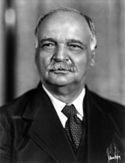
|
Charles Curtis (1860–1936) |
March 4, 1925 – March 4, 1933 |
Whig | 1924 1928 |
Reed Smoot | |
| 28 | 
|
John Nance Garner (1860–1936) |
March 4, 1933 – March 4, 1941 |
Nationalist | 1932 1936 |
Alf Landon | |
| 29 | 
|
Alf Landon (1887–1987) |
March 4, 1941 – December 9, 1941 |
Nationalist | 1940 | John J. Pershing | |
| French Protectorate State (1941-1946) | |||||||
| 30 | 
|
Charles de Gaulle (1890–1970) |
December 9, 1941 – January 26, 1946 |
Independent National Republican |
– | ||
| 31 | 
|
Félix Gouin (1884–1977) |
January 26, 1946 – June 24, 1946 |
French Section of the Workers International | – | ||
| 32 | 
|
Georges Bidault (1899–1983) |
January 26, 1946 – June 24, 1946 |
Popular Republican Movement | – | ||
| 33 | 
|
Vincent Auriol (1884–1966) |
November 28, 1946 – December 16, 1946 |
French Section of the Workers International | – | ||
| 34 | 
|
Léon Blum (1872–1950) |
December 16, 1946 – January 16, 1947 |
French Section of the Workers International | – | ||
| 35 | 
|
Vincent Auriol (1884–1966) |
January 16, 1947 – January 20, 1947 |
French Section of the Workers International | – | ||
| United States of America (1946-present) | |||||||
| 36 | 
|
Eleanor Roosevelt (1884–1962) |
January 20, 1947 – January 20, 1951 |
Whig | 1946 | Adlai Stevenson | |
| 37 | 
|
Douglas MacArthur (1880–1964) |
January 20, 1951 – August 9, 1953 Impeached |
Nationalist | 1950 | Thomas Dewey | |
| 38 | 
|
Thomas Dewey (1884–1962) |
August 9, 1953 – January 20, 1955 |
Nationalist | – | Earl Warren | |
| 39 | 
|
Eleanor Roosevelt (1902–1971) |
January 20, 1955 – January 20, 1959 |
Whig | 1954 | Adlai Stevenson | |
| 40 | 
|
Strom Thurmond (1902–2003) |
January 20, 1959 – January 20, 1967 |
Nationalist | 1958 1962 |
Robert Byrd | |
| 41 | 
|
Martin Luther King Jr. (1929–1968) |
January 20, 1967 – April 4, 1968 Died in office |
Independent | 1966 | Thurgood Marshall | |
| 42 | 
|
Thurgood Marshall (1908–1993) |
April 4, 1968 – January 20, 1969 Resigned |
Whig | – | Vacant throughout presidency | |
| – | 
|
Charles A. Halleck (1900–1988) Acting President |
January 20, 1969 – April 15, 1969 |
Nationalist | – | – | |
| 43 | 
|
Nelson Rockefeller (1908–1979) |
April 15, 1969 – January 20, 1979 |
Nationalist | 1969 (special) 1970 1974 |
George Romney | |
| 44 | 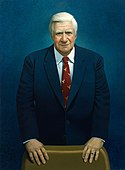
|
Tip O'Neill (1912–1994) |
January 20, 1979 – April 25, 1980 Resigned |
Whig | 1978 | Walter Mondale | |
| 45 | 
|
Walter Mondale (1928–2021) |
April 25, 1980 – January 20, 1987 |
Whig | – 1982 |
Ronald Reagan (Nationalist) John F. Kennedy Kennedy assassinated June 15, 1987 Michael Dukakis | |
| 46 | 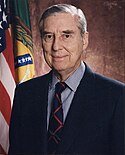
|
Lloyd Bentsen (1921–2006) |
January 20, 1987 – January 20, 1991 |
Farmer–Labor | 1986 | Jimmy Carter | |
| 47 | 
|
Nelson Mandela (1918–2013) |
January 20, 1991 – January 20, 1995 |
African National Congress | 1990 | F. W. de Klerk | |
| 48 | 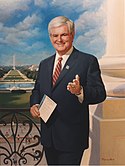
|
Newt Gingrich (born 1942) |
January 20, 1995 – January 20, 1999 |
Nationalist | 1990 | F. W. de Klerk | |
| 49 | 
|
Ross Perot (1930-2019) |
January 20, 1999 – January 20, 2003 |
Independent | 1998 | F. W. de Klerk | |
| 50 | 
|
Rudy Giuliani (born 1944) |
January 20, 2003 – February 12, 2007 Impeached |
Nationalist | 2002 2006 |
Colin Powell | |
| 51 | 
|
Colin Powell (1937-2021) |
February 12, 2007 – January 20, 2011 |
Nationalist | – | John McCain | |
| 52 | 
|
Barbara Boxer (born 1940) |
January 20, 2011 – January 20, 2019 |
Whig | 2010 2014 |
Barack Obama | |
| 53 | 
|
Elon Musk (born 1971) |
January 20, 2019 – January 20, 2023 |
African National Congress–Nationalist (Conglomerate) Nationalist |
2018 | Jacob Zuma Zuma fired November 7, 2020 Ron DeSantis | |
| 54 | 
|
Raphael Warnock (born 1969) |
February 12, 2007 – January 20, 2011 |
Whig–Farmer–Labor (Conglomerate) Nationalist |
2022 | Gretchen Whitmer | |
The most cursed alternate history, annotated
[edit]| No.[c] | Portrait | Name (Birth–Death) |
Term[1] | Party[d][2] | Election | Vice President[3] | |
|---|---|---|---|---|---|---|---|
| Author's note: The only rule I gave myself for forming this timeline was that anyone who was President in real life cannot be President in this timeline, although some real-life Presidents serve as Vice President in this timeline. Otherwise, I just tried to make it as cursed as possible. I also added annotations to explain the historical circumstances behind some administrations. | |||||||
| 1 | 
|
John Hancock (1737–1793) |
April 30, 1789 – March 4, 1793 |
Federalist | 1788–1789 | Benjamin Franklin | |
| Hancock retires after one term due to declining health (he died in October 1793 in our timeline) | |||||||
| 2 | 
|
George Clinton (1739–1812) |
March 4, 1793 – March 4, 1797 |
Anti-Federalist | 1792 | Pierre Van Cortlandt | |
| 3 | 
|
Thomas Pinckney (1739–1812) |
March 4, 1797 – March 4, 1807 |
Federalist | 1796 1800 1804 |
John Jay | |
| Pinckney establishes a ten-year precedent, retiring to allow his brother Charles Cotesworth Pinckney to become President; however the Democratic-Republican party usurps power in the 1806 special election | |||||||
| 4 | 
|
Robert R. Livingston (1746–1814) |
March 4, 1807 – May 4, 1809 |
Democratic-Republican | 1806 (special) |
Thomas Jefferson | |
| Constitutional crisis over whether there should be an election in 1808; after the Supreme Court rules the results of the election valid in April, the transfer of power is delayed until May 4 | |||||||
| 5 | 
|
Alexander Hamilton (1755 or 1757–1836) |
May 4, 1809 – March 4, 1813 |
Federalist | 1808 | Charles Cotesworth Pinckney Pinckney resigned June 25, 1812 Rufus King | |
| Hamilton, who in this timeline defeats Aaron Burr in their duel, ascends to the presidency upon the (real-life) death of Livingston. Pinckney leaves office to serve as a commander in the War of 1812. Dearborn wins the 1812 election in a landslide due to Hamilton's perceived weakness over the armed forces; this leads to the dissolution of the Federalist Party and a one-party state in America. | |||||||
| 6 | 
|
Henry Dearborn (1751–1829) |
March 4, 1813 – March 4, 1823 |
Democratic-Republican | 1812 1816 1820 |
John Langdon Langdon died September 18, 1819 Henry Clay | |
| Henry Clay ascends to the vice presidency upon John Langford's death, following the precedent of King's ascension seven years earlier. Dearborn retires after ten years in office; to avoid a crisis like before, a constitutional amendment of automatic secession to the Presidency is created. | |||||||
| 7 | 
|
Henry Clay (1777–1852) |
March 4, 1823 – March 4, 1833 |
Democratic-Republican National Republican |
– 1824 1828 |
Andrew Jackson Jackson resigned November 25, 1830 John Quincy Adams | |
| Jackson resigns over Clay's refusal to sign the Indian Removal Act, fracturing the Democratic and Republican parties. Due to the tense feud between Clay and Jackson and the election ending without a majority winner, William Wirt is chosen by the House of Representatives as a compromise candidate. This proved to be an unpopular decision, establishing a national popular vote with a runoff election should no one candidate achieve a majority. | |||||||
| 8 | 
|
William Wirt (1772–1834) |
March 4, 1833 – February 18, 1834 Died in office |
Whig | 1832 | Amos Ellmaker | |
| Ellmaker ascends to the Presidency on Wirt's death, but a deadlocked Senate fails to agree on a vice president | |||||||
| 9 | 
|
Amos Ellmaker (1787–1851) |
February 18, 1834 – March 4, 1937 |
Whig | – | Vacant throughout presidency | |
| 10 | 
|
John C. Calhoun (1782–1850) |
March 4, 1837 – March 4, 1841 |
Democratic | 1836 | Richard Mentor Johnson | |
| Calhoun's defeat hastens the Civil War, which happens during what IRL was the Mexican-American War. As a result Mexican territory won in that war does not join the union until later. | |||||||
| 11 | 
|
John Sergeant (1779–1852) |
March 4, 1841 – March 4, 1849 |
Whig | 1840 1844 |
Edward Everett | |
| Union decisively wins the Civil War, and strong pro-Indian and anti-slavery sentiments after the war lead to a Whig supermajority and the dissolution of the Democratic party. Sergeant retires after his term, setting the new precedent of eight years, to allow war hero Winfield Scott to ascend to the Presidency. | |||||||
| 12 | 
|
Winfield Scott (1786–1866) |
March 4, 1849 – March 4, 1857 |
Whig | 1848 1852 |
Charles Francis Adams | |
| 13 | 
|
Charles Francis Adams (1807–1858) |
March 4, 1857 – April 15, 1858 Died in office |
Whig | 1856 | Charles Francis Adams | |
| Adams is assassinated by a Southern suffragist | |||||||
| 14 | 
|
Edward Everett (1794–1865) |
April 15, 1858 – March 4, 1861 |
Whig | – | Millard Fillmore | |
| Republican party begins to court southerners and opposers to civil rights | |||||||
| 15 | 
|
Lewis Cass (1782–1866) |
March 4, 1861 – March 4, 1865 |
Republican | 1860 | David Rice Atchinson | |
| 16 | 
|
David Rice Atchinson (1807–1886) |
March 4, 1865 – March 4, 1869 |
Republican | 1864 | John C. Breckenridge | |
| Cass retires after one term due to health issues. The unpopularity of Atchison, and increased civil unrest, leads to a prolonged war between the United States and an invading Mexico. Hamlin remains loyal to the Whig cause after the dissolution of the Democratic party and the rightward shift of the Republican party. Whigs follow a more libertarian policy while the Republicans follow a more authoritarian, anti-civil rights policy. | |||||||
| 17 | 
|
Hannibal Hamlin (1809–1891) |
March 4, 1869 – March 4, 1877 |
Whig | 1868 1872 |
Randolph Barnes Marcy | |
| Following the Supreme Court's ruling in 1872 that women must be allowed to vote and run for public office, prominent women and African-American leaders form the Equal Rights party as an alternative to both the Whigs and Republicans. As the hero of this movement, Anthony wins a runoff election against President Hamlin. | |||||||
| 18 | 
|
Susan B. Anthony (1820–1906) |
March 4, 1877 – March 4, 1881 |
Equal Rights | 1876 | Elizabeth Cady Stanton | |
| 19 | 
|
Winfield Scott Hancock (1824–1886) |
March 4, 1881 – February 9, 1886 Died in office |
Whig | 1880 1884 |
Samuel J. Tilden | |
| Hancock, who is not related to either Winfield Scott or John Hancock, dies in office in 1886 just as he did in real life. | |||||||
| 20 | 
|
Samuel J. Tilden (1814–1896) |
February 9, 1886 – March 4, 1889 |
Whig | – | Grover Cleveland | |
| 21 | 
|
James G. Blaine (1830–1903) |
March 4, 1889 – March 4, 1897 |
Republican Equal Rights |
1888 1892 |
Levi P. Morton | |
| Blaine and Morton defect to the Equal Rights party over their party's opposition to civil rights; this victory over new Republican candidate John A. Logan leads to more widespread acceptance of civil rights and the Republicans stick to more conservative politics not relating to race. | |||||||
| 22 | 
|
William Jennings Bryan (1860–1901) |
March 4, 1897 – September 14, 1901 Died in office |
Whig | 1896 1900 |
Arthur Sewall Sewall died September 5, 1900 Thomas E. Watson | |
| Watson ascends to the vice presidency upon Sewall's death, then to the presidency after Bryan is assassinated by an anarchist, leading to mass panic over left-wing and communist policies | |||||||
| 23 | 
|
Thomas E. Watson (1856–1922) |
September 14, 1901 – March 4, 1905 |
Whig | – | Booker T. Washington | |
| 24 | 
|
Charles W. Fairbanks (1852–1918) |
March 4, 1905 – March 4, 1917 |
Republican | 1904 1908 1912 |
Booker T. Washington | |
| Fairbanks refuses to follow the two-term limit (leading to the enshrinement of it into law) and is defeated for a fourth term with war raging in Europe | |||||||
| 25 | 
|
Newton D. Baker (1871–1937) |
March 4, 1917 – March 4, 1921 |
Whig | 1916 | Thomas R. Marshall | |
| 26 | 
|
W. E. B. Du Bois (1868–1963) |
March 4, 1921 – March 4, 1925 |
Equal Rights | 1920 | Julius Rosenwald | |
| 27 | 
|
Charles Curtis (1860–1936) |
March 4, 1925 – March 4, 1933 |
Whig | 1924 1928 |
Reed Smoot | |
| As President, Curtis grants Native American territories statehood and gets the Equal Rights Amendment passed. The Whigs and Equal Rights merge as their policies largely become redundant, and the Republicans begin to court disillusioned Whigs, forming the Nationalist party. | |||||||
| 28 | 
|
John Nance Garner (1860–1936) |
March 4, 1933 – March 4, 1941 |
Nationalist | 1932 1936 |
Alf Landon | |
| 29 | 
|
Alf Landon (1887–1987) |
March 4, 1941 – December 9, 1941 |
Nationalist | 1940 | John J. Pershing | |
| Following Pearl Harbor, an economically and war-weakened America (in this timeline, the Mexican-American War lasted much longer than in real life) enters a French protectorate | |||||||
| French Protectorate State (1941-1946) | |||||||
| 30 | 
|
Charles de Gaulle (1890–1970) |
December 9, 1941 – January 26, 1946 |
Independent National Republican |
– | ||
| Now stronger, France never falls to Germany, hastening the war. De Gaulle drops the atomic bomb on a weakened Japan anyway, leading to strong opposition to the protectorate. | |||||||
| 31 | 
|
Félix Gouin (1884–1977) |
January 26, 1946 – June 24, 1946 |
French Section of the Workers International | – | ||
| De Gaulle resigns, just has he did in real life, and President Gouin agrees to hold a democratic election in 1946 to return the US to solely American rule. All further Presidents in this section mirror the real-life Presidency of France. That Vincent Auriol took office four days before the reintroduction of American democracy is purely coincidental. | |||||||
| 32 | 
|
Georges Bidault (1899–1983) |
January 26, 1946 – June 24, 1946 |
Popular Republican Movement | – | ||
| 33 | 
|
Vincent Auriol (1884–1966) |
November 28, 1946 – December 16, 1946 |
French Section of the Workers International | – | ||
| 34 | 
|
Léon Blum (1872–1950) |
December 16, 1946 – January 16, 1947 |
French Section of the Workers International | – | ||
| 35 | 
|
Vincent Auriol (1884–1966) |
January 16, 1947 – January 20, 1947 |
French Section of the Workers International | – | ||
| United States of America (1946-present) | |||||||
| 36 | 
|
Eleanor Roosevelt (1884–1962) |
January 20, 1947 – January 20, 1951 |
Whig | 1946 | Adlai Stevenson | |
| 37 | 
|
Douglas MacArthur (1880–1964) |
January 20, 1951 – August 9, 1953 Impeached |
Nationalist | 1950 | Thomas Dewey | |
| MacArthur impeached and removed for war crimes in Korea | |||||||
| 38 | 
|
Thomas Dewey (1884–1962) |
August 9, 1953 – January 20, 1955 |
Nationalist | – | Earl Warren | |
| 39 | 
|
Eleanor Roosevelt (1902–1971) |
January 20, 1955 – January 20, 1959 |
Whig | 1954 | Adlai Stevenson | |
| 40 | 
|
Strom Thurmond (1902–2003) |
January 20, 1959 – January 20, 1967 |
Nationalist | 1958 1962 |
Robert Byrd | |
| 41 | 
|
Martin Luther King Jr. (1929–1968) |
January 20, 1967 – April 4, 1968 Died in office |
Independent | 1966 | Thurgood Marshall | |
| King ends war in Vietnam upon entering office, reinstilling trust in the American military but angering Nationalist loyalists. Upon his assassination, the Nationalist-controlled Congress refuses to elevate a VP, and Marshall resigns under political pressure from an overwhelming Nationalist midterm victory in 1968. | |||||||
| 42 | 
|
Thurgood Marshall (1908–1993) |
April 4, 1968 – January 20, 1969 Resigned |
Whig | – | Vacant throughout presidency | |
| As Speaker of the House, became acting President; a special election is held on April 1, 1969 with the winner to be installed April 15. | |||||||
| – | 
|
Charles A. Halleck (1900–1988) Acting President |
January 20, 1969 – April 15, 1969 |
Nationalist | – | – | |
| 43 | 
|
Nelson Rockefeller (1908–1979) |
April 15, 1969 – January 20, 1979 |
Nationalist | 1969 (special) 1970 1974 |
George Romney | |
| Rockefeller creates somewhat of a constitutional crisis by seeing a "third term", but the Supreme Court rules that the special election does not constitute a full term. | |||||||
| 44 | 
|
Tip O'Neill (1912–1994) |
January 20, 1979 – April 25, 1980 Resigned |
Whig | 1978 | Walter Mondale | |
| O'Neill resigns following failed attempt to rescue Iranian hostages | |||||||
| 45 | 
|
Walter Mondale (1928–2021) |
April 25, 1980 – January 20, 1987 |
Whig | – 1982 |
Ronald Reagan (Nationalist) John F. Kennedy Kennedy assassinated June 15, 1987 Michael Dukakis | |
| Mondale agrees to have Nationalist Ronald Reagan as VP in attempts to smooth over Iranian hostage crisis, which ends successfully in October 1980. Having succeeded, Mondale wins another term in the White House, defeating his own VP. Kennedy was never assassinated in 1963 as he was not President, but as the leading candidate for the Whig nomination in 1986, he is assassinated on the campaign trail. Massachusetts governor Michael Dukakis takes his place both as VP and the presumptive Whig nominee, but with Mondale at odds with Dukakis, Mondale decides to endorse the centrist third party Farmer-Labor Party | |||||||
| 46 | 
|
Lloyd Bentsen (1921–2006) |
January 20, 1987 – January 20, 1991 |
Farmer–Labor | 1986 | Jimmy Carter | |
| In the late 1980s, South Africa is liberated and annexed from apartheid rule. Though a short conflict, the annexation is deemed unpopular among the American people. | |||||||
| 47 | 
|
Nelson Mandela (1918–2013) |
January 20, 1991 – January 20, 1995 |
African National Congress | 1990 | F. W. de Klerk | |
| The contentious 1994 runoff election between Bentsen and Mandela leads the United States to adopt ranked-choice voting starting with the 1998 elections. | |||||||
| 48 | 
|
Newt Gingrich (born 1942) |
January 20, 1995 – January 20, 1999 |
Nationalist | 1994 | Dennis Hastert | |
| Gingrich is elected on strong anti-South African sentiments, but independence movements repeatedly fail in Congress. | |||||||
| 49 | 
|
Ross Perot (1930-2019) |
January 20, 1999 – January 20, 2003 |
Independent | 1998 | Pat Buchanan | |
| Perot's poor response to 9/11 is widely criticized, making him largely a lame duck President for the remainder of his tenure. | |||||||
| 50 | 
|
Rudy Giuliani (born 1944) |
January 20, 2003 – February 12, 2007 Impeached |
Nationalist | 2002 2006 |
Colin Powell | |
| Initial results show Whig candidate Barbara Boxer as the winner of the 2006 election, but Giuliani successfully sued and was declared the winner by a partisan Supreme Court. Giuliani would be impeached and removed for his actions, which included having his supporters storm the Capital during the vote counting on January 6, 2007. | |||||||
| 51 | 
|
Colin Powell (1937-2021) |
February 12, 2007 – January 20, 2011 |
Nationalist | – | John McCain | |
| 52 | 
|
Barbara Boxer (born 1940) |
January 20, 2011 – January 20, 2019 |
Whig | 2010 2014 |
Barack Obama | |
| 53 | 
|
Elon Musk (born 1971) |
January 20, 2019 – January 20, 2023 |
African National Congress–Nationalist (Conglomerate) Nationalist |
2018 | Jacob Zuma Zuma fired November 7, 2020 Ron DeSantis | |
| Musk runs as a coalition candidate between the ANC and Nationalist Party. As he begins to turn further to the right and ANC suffers major defeats in the 2020 midterms, Musk fires Zuma and renounces the ANC, becoming a solely Nationalist President with new Vice President Ron DeSantis being confirmed by Congress later that day. | |||||||
| 54 | 
|
Raphael Warnock (born 1969) |
January 20, 2023 – present |
Whig–Farmer–Labor (Conglomerate) |
2022 | Gretchen Whitmer | |
Cite error: There are <ref group=lower-alpha> tags or {{efn}} templates on this page, but the references will not show without a {{reflist|group=lower-alpha}} template or {{notelist}} template (see the help page).
- ^ a b LOC; whitehouse.gov.
- ^ a b Guide to U.S. Elections (2010), pp. 257–258.
- ^ a b LOC.

